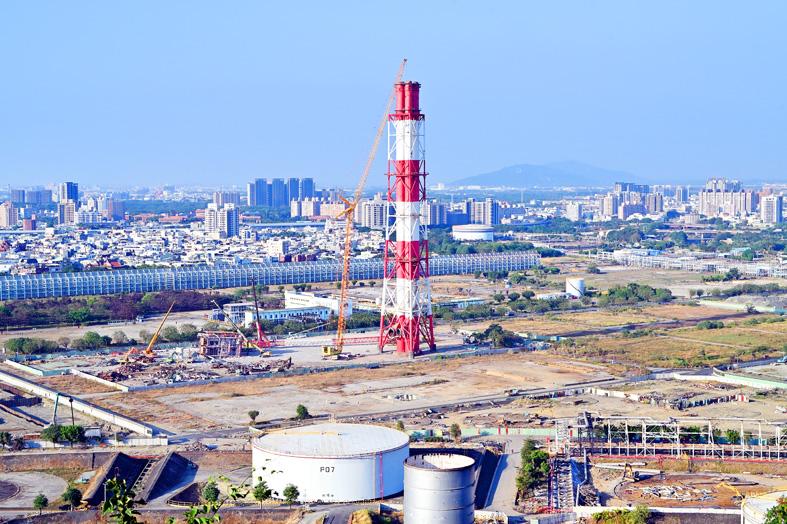The Kaohsiung City Government yesterday approved Taiwan Semiconductor Manufacturing Co’s (TSMC, 台積電) plan to build a new plant in the city, saying a second environmental review was not necessary.
The plant is to focus on making 7-nanometer and 28-nanometer chips, in line with rising demand from global customers.
The city government discussed for two hours environmental influences that would arise from TSMC’s plant and concluded that the world’s largest contract chipmaker met all requirements, rendering a second assessment unnecessary.

Photo: Ko Yu-hao, Taipei Times
TSMC is Apple Inc’s sole chip supplier. Its other major customers include Nvidia Corp, Intel Corp, Advanced Micro Devices Inc, Qualcomm Inc and MediaTek Inc (聯發科).
The COVID-19 pandemic has accelerated a global digital transformation as lockdowns in different parts of the world has led to a surge in demand for personal computers and other devices that connect to the Internet, the Hsinchu-based chipmaker has said.
Chip demand also picked up due to widespread use of online payment tools and the increasing popularity of electric vehicles, it said.
The planned TSMC facility has boosted housing prices in Kaohsiung by double-digit percentage points since its announcement in September last year.
TSMC has come up with plans to address the unfavorable side-effects of its manufacturing activity and has pledged to use solar energy sources, Kaohsiung officials said.
The new complex would cover 9.2 hectares of land and would cover a total of 12 hectares after factoring in greenery, the company said.
TSMC’s investment marks a concrete leap in the city government’s efforts to build a semiconductor corridor, it added.

TECH BOOST: New TSMC wafer fabs in Arizona are to dramatically improve US advanced chip production, a report by market research firm TrendForce said With Taiwan Semiconductor Manufacturing Co (TSMC, 台積電) pouring large funds into Arizona, the US is expected to see an improvement in its status to become the second-largest maker of advanced semiconductors in 2027, Taipei-based market researcher TrendForce Corp (集邦科技) said in a report last week. TrendForce estimates the US would account for a 21 percent share in the global advanced integrated circuit (IC) production market by 2027, sharply up from the current 9 percent, as TSMC is investing US$65 billion to build three wafer fabs in Arizona, the report said. TrendForce defined the advanced chipmaking processes as the 7-nanometer process or more

China’s Huawei Technologies Co (華為) plans to start mass-producing its most advanced artificial intelligence (AI) chip in the first quarter of next year, even as it struggles to make enough chips due to US restrictions, two people familiar with the matter said. The telecoms conglomerate has sent samples of the Ascend 910C — its newest chip, meant to rival those made by US chipmaker Nvidia Corp — to some technology firms and started taking orders, the sources told Reuters. The 910C is being made by top Chinese contract chipmaker Semiconductor Manufacturing International Corp (SMIC, 中芯) on its N+2 process, but a lack

Who would not want a social media audience that grows without new content? During the three years she paused production of her short do-it-yourself (DIY) farmer’s lifestyle videos, Chinese vlogger Li Ziqi (李子柒), 34, has seen her YouTube subscribers increase to 20.2 million from about 14 million. While YouTube is banned in China, her fan base there — although not the size of YouTube’s MrBeast, who has 330 million subscribers — is close to 100 million across the country’s social media platforms Douyin (抖音), Sina Weibo (新浪微博) and Xiaohongshu (小紅書). When Li finally released new videos last week — ending what has

OPEN SCIENCE: International collaboration on math and science will persevere even if the incoming Trump administration imposes strict controls, Nvidia’s CEO said Nvidia Corp CEO Jensen Huang (黃仁勳) said on Saturday that global cooperation in technology would continue even if the incoming US administration imposes stricter export controls on advanced computing products. US president-elect Donald Trump, in his first term in office, imposed restrictions on the sale of US technology to China citing national security — a policy continued under US President Joe Biden. The curbs forced Nvidia, the world’s leading maker of chips used for artificial intelligence (AI) applications, to change its product lineup in China. The US chipmaking giant last week reported record-high quarterly revenue on the back of strong AI chip